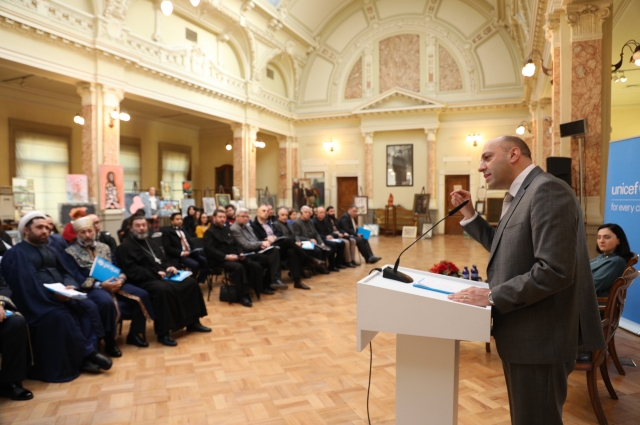Leaders of All Religious Denominations in Georgia Discuss Child Rights
Leaders from Georgia’s all religious denominations gathered at a special conference to discuss child rights and the role of religious leaders in promoting and protecting child rights. The conference was organized by the State Agency for Religious Issues and UNICEF Georgia.
The conference was attended by representatives from diplomatic and international organizations, government agencies, civil society, and the media.
The issues discussed at the conference included: cooperation with faith-based organizations, the Convention on the Rights of the Child after 30 years, achievements and remaining challenges in Georgia, the Code on the Rights of the Child of Georgia, child rights in different religions, and the role of religious leaders in protecting and promoting child rights.
The conference was organized as part of the partnership between the State Agency for Religious Issues and UNICEF Georgia. The aim of the cooperation is to promote and protect child rights through engagement with different religious denominations.
“We value our partnership with religious leaders and we want to make sure it brings tangible results for children,” said Dr. Ghassan Khalil, UNICEF Representative in Georgia. “We have initiated an open and mutually respectful dialogue with all the religious denominations to mobilize their influence to promote child rights and end rights violations, such as violence against children, in their communities. UNICEF will continue strengthening this partnership with religious denominations in the best interests of children in Georgia,” added Dr. Khalil.
UNICEF Georgia has already organized thematic meetings and seminars with religious leaders on child rights, and on the situation of children in Georgia, with a focus on their roles in protecting children’s rights.
Three workshops, with 100 Orthodox Christian priests and Muslim muftis and imams, have already been conducted, in addition to a session with representatives of the Lutheran Church. More seminars are planned for 2020.
UNICEF has a long history of working with faith-based organizations and religious leaders. Religious leaders have deep and trusted relationships within their communities and often have strong links with the most disadvantaged and vulnerable people. They are well-positioned to support the poorest, most vulnerable, and hardest to reach children and families.












